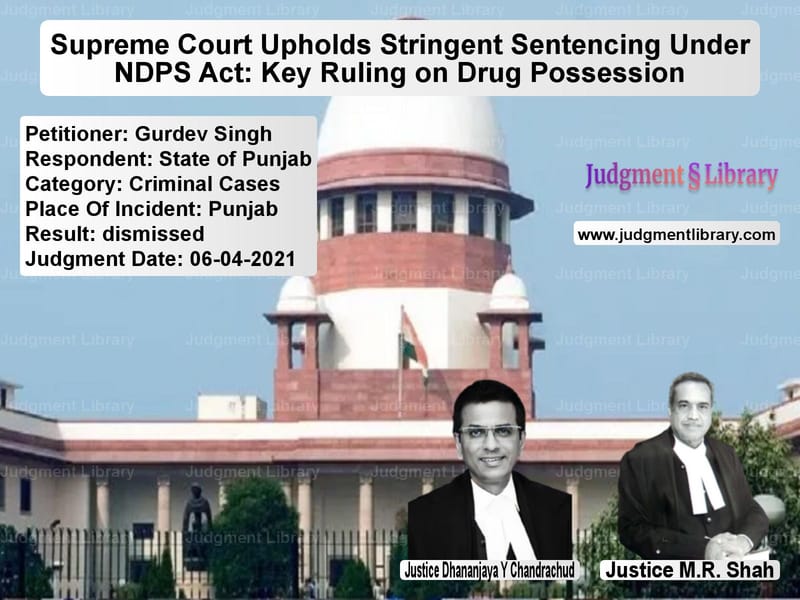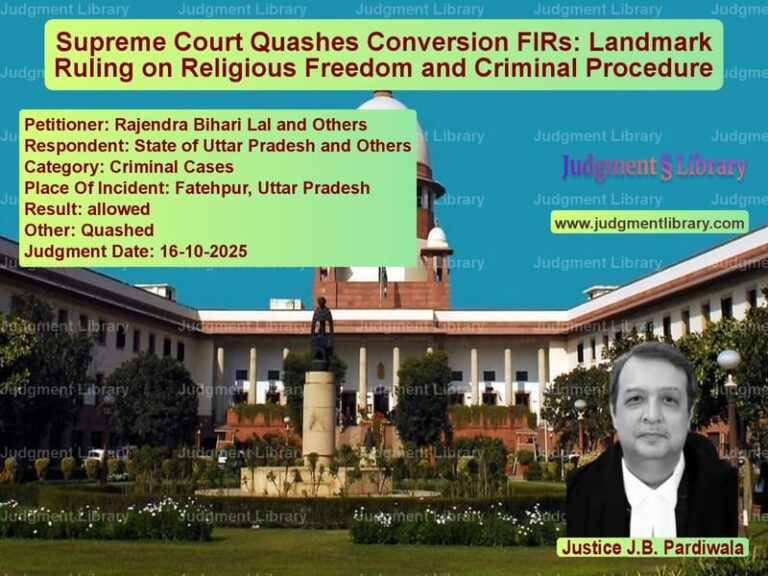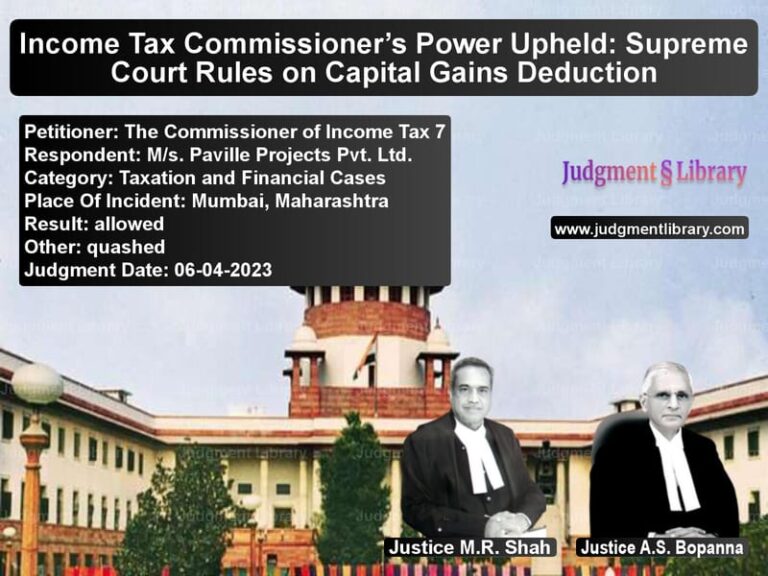Supreme Court Upholds Stringent Sentencing Under NDPS Act: Key Ruling on Drug Possession
The Supreme Court of India, in the case of Gurdev Singh v. State of Punjab, reaffirmed the strict sentencing framework under the Narcotic Drugs and Psychotropic Substances Act, 1985 (NDPS Act). The judgment addressed the legality of imposing higher-than-minimum sentences and provided clarity on the factors courts must consider when sentencing under the Act.
Background of the Case
The case involved the conviction of Gurdev Singh, who was found guilty under Section 21 of the NDPS Act for possessing 1 kg of heroin. The Special Court sentenced him to 15 years of rigorous imprisonment (RI) along with a fine of Rs. 2 lakhs. The Punjab and Haryana High Court upheld this sentence.
Read also: https://judgmentlibrary.com/mukhtar-ansaris-custody-supreme-court-orders-transfer-to-uttar-pradesh/
Feeling aggrieved, Gurdev Singh appealed to the Supreme Court, challenging the sentence imposed by the lower courts. His appeal did not contest the conviction but focused solely on the sentence’s quantum.
Key Issues Raised
- Whether the Special Court and High Court justified imposing a sentence higher than the minimum 10-year imprisonment prescribed under the NDPS Act.
- Whether the courts considered the mitigating and aggravating circumstances before sentencing.
- Whether the sentencing principles under Section 32B of the NDPS Act were correctly applied.
Arguments by the Appellant (Gurdev Singh)
- “The minimum punishment for possession of a commercial quantity of narcotics under the NDPS Act is 10 years, and the courts failed to justify the imposition of a 15-year sentence.”
- “The courts did not consider the mitigating factors, including that I am a first-time offender and a poor man, acting only as a carrier.”
- “The alleged main supplier was never arrested, and the prosecution did not provide evidence to prove a larger conspiracy.”
Arguments by the Respondent (State of Punjab)
- “The appellant was caught in possession of 1 kg of heroin, which is four times the commercial quantity (250 grams).”
- “The higher quantum of punishment was justified based on the large quantity of drugs found in his possession.”
- “The Supreme Court in previous cases has ruled that a higher quantity of narcotics is a sufficient reason to impose a higher-than-minimum sentence.”
Supreme Court’s Observations and Ruling
1. Legal Framework for Sentencing Under NDPS Act
- “Section 21 of the NDPS Act prescribes a minimum sentence of 10 years for possession of commercial quantities of narcotic drugs, with the maximum sentence extending to 20 years.”
- “Section 32B of the NDPS Act provides additional factors courts may consider when imposing a sentence higher than the minimum.”
2. Courts’ Discretion in Sentencing
- “A court must justify the imposition of a sentence higher than the statutory minimum by considering aggravating factors, such as the quantity of narcotics involved, organized criminal activity, and recidivism.”
- “The quantity of the contraband is a critical factor in determining the sentence. The Supreme Court previously held that possession of a substantially higher quantity than the minimum commercial threshold warrants a stricter sentence.”
3. Evaluation of Mitigating and Aggravating Factors
- “While the appellant argued that he was a mere carrier and a first-time offender, these claims do not automatically reduce the punishment.”
- “The appellant was found in possession of 1 kg of heroin, significantly exceeding the 250-gram commercial quantity threshold.”
- “Considering the societal impact of drug trafficking, the court must prioritize deterrence over leniency in sentencing under the NDPS Act.”
4. Precedents Cited by the Court
- “In Rafiq Qureshi v. NCB, the Supreme Court upheld a sentence of 16 years for possession of 609.6 grams of heroin, reaffirming that quantity is a key determinant of sentencing.”
- “The Court ruled that while mitigating factors may be considered, they cannot override the aggravating circumstance of large-scale drug possession.”
Supreme Court’s Judgment
The Supreme Court upheld the 15-year sentence imposed on Gurdev Singh and ruled that:
- The Special Court and High Court correctly applied the principles under the NDPS Act.
- The large quantity of drugs warranted a stricter sentence, even though no additional factors under Section 32B were explicitly mentioned.
- The mitigating circumstances presented by the appellant were insufficient to warrant a reduced sentence.
- Sentencing discretion lies with the trial court, and unless exercised arbitrarily, the higher courts should not interfere.
Key Takeaways from the Judgment
- Higher drug quantity justifies enhanced sentencing: Even in the absence of other aggravating factors, possession of a large quantity of narcotics supports a stricter sentence.
- Courts must balance deterrence and rehabilitation: While personal circumstances may be considered, the broader impact on society and drug trafficking deterrence must take precedence.
- Sentencing under NDPS Act is stringent: The court reiterated that the NDPS Act provides for severe penalties to curb drug trafficking and that courts must enforce them strictly.
- Judicial discretion in sentencing is not absolute: Sentencing must be backed by clear reasoning, and higher-than-minimum sentences must be justified based on legal principles.
Conclusion
The Supreme Court’s ruling in Gurdev Singh v. State of Punjab reinforces the principle that possession of large quantities of narcotics justifies strict punishment under the NDPS Act. The judgment underscores the importance of balancing judicial discretion with the need for deterrence in drug-related offenses. By upholding the 15-year sentence, the Court has sent a strong message against drug trafficking while reaffirming the NDPS Act’s strict sentencing framework.
Petitioner Name: Gurdev Singh.Respondent Name: State of Punjab.Judgment By: Justice Dhananjaya Y Chandrachud, Justice M.R. Shah.Place Of Incident: Punjab.Judgment Date: 06-04-2021.
Don’t miss out on the full details! Download the complete judgment in PDF format below and gain valuable insights instantly!
Download Judgment: gurdev-singh-vs-state-of-punjab-supreme-court-of-india-judgment-dated-06-04-2021.pdf
Directly Download Judgment: Directly download this Judgment
See all petitions in Drug Possession Cases
See all petitions in Fraud and Forgery
See all petitions in Judgment by Dhananjaya Y Chandrachud
See all petitions in Judgment by Mukeshkumar Rasikbhai Shah
See all petitions in dismissed
See all petitions in supreme court of India judgments April 2021
See all petitions in 2021 judgments
See all posts in Criminal Cases Category
See all allowed petitions in Criminal Cases Category
See all Dismissed petitions in Criminal Cases Category
See all partially allowed petitions in Criminal Cases Category







